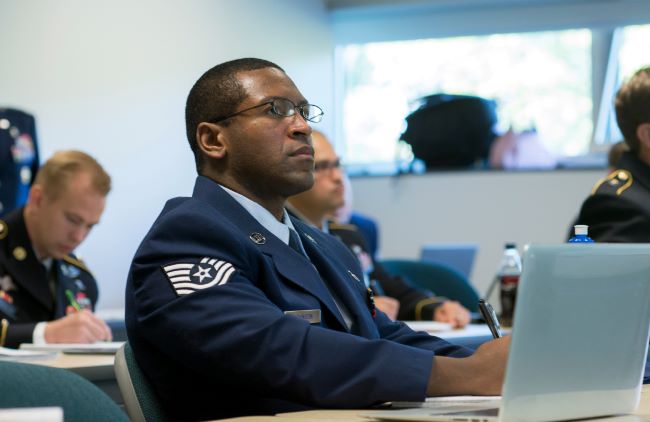
George Mason University further solidified its strong relationship with the military community with a five-year, $20 million extension of the Enlisted to Medical Degree Preparatory Program (EMDP2).
Through a partnership with the Uniformed Services University of Health Services (USU) that began in 2014, highly qualified active-duty military members complete an intense, two-year academic program that prepares them for medical school. Mason provides the coursework, Medical College Admission Test (MCAT) prep courses and pre-health advising on a contract basis. The program is believed to be the only one of its kind between the military and a civilian university.
“Those in the military and in healthcare have always played a critical role in our society, and the past year only magnified their impact on our health and well-being as well as our safety,” Provost Mark R. Ginsberg said. “EMDP2 has been significant in providing an important path to medical school while strengthening Mason’s relationships with the area’s military community. But more importantly, continuing this contract is an investment that will help many people while also advancing the military healthcare system.”
Donna Fox, associate dean in the College of Science’s Office of Academic and Student Affairs, is proud that Mason can offer this option to so many service members so they can follow their dreams while continuing to serve their country. Born into a military family, Fox was married to an Army officer for his entire career and welcomed the chance to give back to a community that has meant so much to her and her family.
“What I love most is that we are helping people who might, otherwise, have never seen themselves in medicine get accepted into medical school,” said Fox.
The program provides qualified servicemembers from all four branches of the U.S. military with an undergraduate degree of any kind the opportunity to devote two years to classroom study and preparation for the MCAT without having to worry about deploying or training. Their sole responsibility is to be full-time students at Mason’s Science and Technology Campus studying biology, physics, chemistry and other similar courses. The full-time, year-round program includes 42 credits of pre-med classes the first year, with the second year devoted to prepping students for med school.
Roughly 92% of the program’s students have been accepted into medical schools so far, with more than 100 currently attending medical school, Fox said.
Servicemembers automatically receive officer commissions upon acceptance to medical school, although they must still complete an officer basic course located at various places across the country based on their branch of service.
The Department of Defense created the program in the hopes of slowing down the loss of talented enlisted military members who didn’t see any way of staying in the service and realizing their dreams of becoming a doctor.
Students for the program are selected by the U.S. military and are admitted as a cohort in the fall semester only.
“It’s extremely gratifying to see them reach their dreams,” said Fox. “I’ve been here 28 years, and I can’t think of any better way to finish out my career at Mason.”
